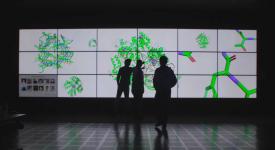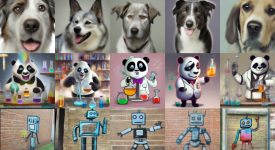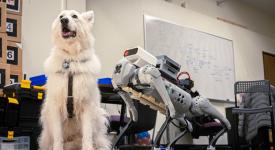Computer Science Doctoral Student Earns Google Fellowship

11/19/2024 - Mina Huh, a computer science Ph.D. student at UT Austin, has been awarded a Google Ph.D. Fellowship, the company announced on November 14.

11/19/2024 - Mina Huh, a computer science Ph.D. student at UT Austin, has been awarded a Google Ph.D. Fellowship, the company announced on November 14.

10/01/2024 - Computer Science and Mathematics senior Alan Baade really enjoys spending hours on problems.Especially the particularly hard ones, he said. Spending 40 hours on one equation with a small break for sleep somewhere in the middle is rewarding to him.“I think it's because you can tell at the end of this you are going to understand the material,” Baade said. “You're going to understand computers.”

09/26/2024 - Biotech advances from UT’s new Deep Proteins group are changing the game with help from artificial intelligence.Working as a chemist in Houston, Danny Diaz spent a lot of time plodding his way through crosstown traffic, pondering how to speed up his research.“I realized that my impact in the short term would be limited to the amount of chemistry experiments I could do with my hands,” he recalled.

09/18/2024 - The University of Texas at Austin has been selected to lead the NSF-Simons AI Institute for Cosmic Origins, a new $20 million research initiative focused on using AI to explore the universe’s biggest mysteries, from dark matter to the origins of life. Greg Durrett, Associate Professor of Computer Science at UT, is a co-investigator on this groundbreaking project, further cementing UT’s leadership in AI research.

09/04/2024 - NSF-funded system expands TACC’s capacity for AI with Arm-based NVIDIA technology

08/01/2024 - Peter Stone of UT computer science leads Sony AI in the U.S. and is now its chief scientist and deputy president.

05/17/2024 - Researchers are using corrupted data to help generative AI models avoid the misuse of images under copyright. Powerful new artificial intelligence models sometimes, quite famously, get things wrong — whether hallucinating false information or memorizing others’ work and offering it up as their own. To address the latter, researchers led by a team at The University of Texas at Austin have developed a framework to train AI models on images corrupted beyond recognition.

05/16/2024 - Guide-dog users and trainers can provide insight into features that make robotic helpers useful in the real world.

03/20/2024 - From large language models to brain-machine interfaces, students work with faculty on cutting-edge research.

03/14/2024 - An innovative approach uses artificial intelligence and biosensors to pave the way for faster drug development.